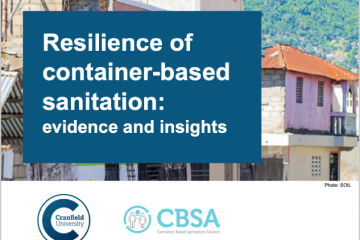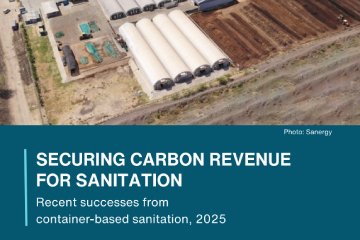This Human Rights Day, read a transcript of a presentation given by Sasha Kramer, CEO of Sustainable Organic Integrated Livelihoods (SOIL) at the 1st IWA NSS conference, in which she shared how her thinking has evolved on the role of CBS in addressing basic service provision and long-term systems change.
At the 1st IWA NSS conference in October, Sasha Kramer took part in a workshop organised by the CBSA, the University of the Western Cape and the Water and Research Commission (WRC) on human rights and Container-Based Sanitation (CBS) where she presented how her thinking has changed around the role of CBS in the path to universal access to sanitation. CBSA is sharing those thoughts with you this Human Rights Day as we remember our commitment to a world where dignity, equality, and justice prevail for all:
As an ecologist and human rights advocate, I was drawn to sanitation by a desire to leverage ecosystem services to address multiple human rights issues simultaneously by linking access to sanitation, food security and environmental justice.
Transforming a public health problem into an environmental solution
SOIL started as a group of human rights advocates in the wake of the 2004 coup d etat in Haiti. As we shifted our focus from acute human rights abuses to the daily human rights violations that result from poverty, we were all intrigued by the idea that through ecological sanitation there was the potential to transform a public health problem into an environmental solution. And I remain committed to the vision of transforming waste into resources.
The question was how? What kind of a toilet and service could do that in a way that met people’s basic needs and protected the health and safety of the providers. When we started off our team was young and enthusiastic and, in many ways, naïve. What we lacked in experience we made up for with passion and creativity. Which is a great starting point.
Designing a toilet which would replace the gold standard of a porcelain flush toilet
We went through many iterations of our toilet design, trying to come up with something that would be broadly aspirational to households. We fiercely believed that our shared passion for the environmental benefits of recycling wastes would shift the needle on what people hoped for and aspired to meet their families’ sanitation needs and we wanted to design a toilet which would replace the gold standard of a porcelain flush toilet.
And I do believe that we have provided a service that is safe and dignified. In our semi-annual satisfaction surveys our clients continue to express broad satisfaction with the toilets, reporting improved sense of safety, pride and comfort associated with having a toilet in their home. Over 90% of SOIL’s clients have never had a household toilet before and the benefits of private access are impossible to deny – we all want that.
We have even had long-time clients who are proud to be a part of the circular economy, From Bertony who was our client spokesperson for many years, to the head of sanitation for the Haitian government who purchased a CBS toilet for her second home, to the 27 SOIL staff members who subscribe to the household toilet service for their families. To my own family.
CAN we shift aspiration away from flush toilets, SHOULD we?
And we spent years defending CBS as the very best on all fronts: the most cost-effective, the ONLY appropriate solution for many flood-prone areas without centralized infrastructure, the most rapidly deployable, the most climate-smart, the most aspirational. And CBS can be, and is, many of these things but over the past 5 years we have been pushed to really think about whether we have effectively shifted the aspiration away from flush toilets and even question whether we should be trying to.
This reflection started as we deepened our partnership with the Haitian government. As I mentioned, the head of sanitation has an EkoLakay toilet, she buys our compost for her garden, she herself has been won over to the idea. But does this mean she is able to sell that idea to others? Does she even want to?
For years she and I have gone back and forth on this issue with me saying “oh but this is the wave of the future, a water-scarce future and all we need to shift the aspiration is nicer CBS models (I still believe this may be true by the way). And she has come back with “your head is in the clouds if you think the Haitian population and the politicians seeking their votes are going to sing the praises of anything other than a porcelain flush toilet.”
Without a GLOBAL shift in aspiration, the flush toilet will remain the gold standard
She forced me to accept that, until there is a GLOBAL shift in aspiration, with wealthy cities and citizens insisting on dry household toilets, the gold standard will continue to be the flush toilet and no politician will be able to effectively push for those without a toilet to aspire to anything less.
DINEPA has agreed that CBS is an integral part of sanitation systems change in Haiti and an invaluable tool for providing transitional access in urban areas throughout the country BUT they do this as part of a larger story which envisions a future where impoverished families do not have to put their poop out in containers while the wealthy simply flush it away.
Embracing CBS’s role as a transitional solution
So where are we now? SOIL is now in a place where we fully embrace our role as a rapidly deployable transitional solution in a broader sanitation ecosystem. We have shown through research that CBS, when well-serviced, meets the basic needs of the population we serve. Our customers are overwhelmingly satisfied with the service, as evidenced by their willingness to pay for it month after month.
The Haitian government welcomes our collaboration and seeks to expand both CBS and composting of human waste throughout the country. We have shown that families who use CBS services are more likely than the general population to invest in a permanent toilet when leaving the service, demonstrating sustained behavior change.
A necessary stop gap, an essential public health intervention and a stepping stone towards equitable sanitation for all
But when push comes to shove, if you dig beneath the surface, neither our clients nor the
government see CBS as the end point, they see it as a necessary stop gap, an essential public health intervention and a stepping stone on the path towards equitable sanitation for all – which means either a much nicer CBS toilet which could be broadly adopted across the socioeconomic spectrum OR a networked sanitation system which ensures the same level of service for all.


